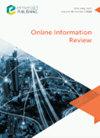How internet use affects personal privacy risk perception: empirical evidence from China
IF 3.1
3区 管理学
Q2 COMPUTER SCIENCE, INFORMATION SYSTEMS
引用次数: 0
Abstract
PurposeThis study aims to empirically examine the relationship between Internet use and personal privacy risk perceptions, the mediating effect of trust and the moderating effect of satisfaction on that relationship, which is exactly conducive to the practice of personal information protection.Design/methodology/approachA moderated mediation model will be employed to test the hypothesized relationships using the 2017 Chinese Society Survey data.FindingsThe authors find that Internet use positively relates to citizens' risk perceptions toward privacy security, and trust partially mediates the relationship between Internet use and privacy risk perception. In addition, the analysis of moderating effects showed that satisfaction with social life significantly enhances the negative impact on individuals' privacy risk perceptions of interpersonal trust. The positively moderating effect of satisfaction with local governments' work mainly reveals the relationship between interpersonal trust (or institutional trust) and citizens' privacy risk perception. Moreover, satisfaction with Internet platforms positively moderates the relationship between consumer trust and privacy risk perception.Originality/valueThis article contributes to the social risk amplification framework by applying it to the personal privacy information protection field, which was rarely discussed before. It also enriches privacy research by identifying the internal mechanism of how Internet use influences citizens' risk perceptions towards privacy information leakage.互联网使用如何影响个人隐私风险认知:来自中国的经验证据
目的本研究旨在实证检验互联网使用与个人隐私风险感知之间的关系、信任对该关系的中介效应以及满意度对该关系的调节效应,恰恰有利于个人信息保护的实践。设计/方法/途径采用调节中介模型,利用2017年中国社会调查数据检验假设关系。研究结果作者发现,互联网使用与公民隐私安全风险感知正相关,信任部分中介了互联网使用与隐私风险感知之间的关系。此外,调节效应分析表明,社会生活满意度显著增强了人际信任对个人隐私风险感知的负面影响。对地方政府工作满意度的正向调节效应主要揭示了人际信任(或制度信任)与公民隐私风险感知之间的关系。此外,对互联网平台的满意度对消费者信任与隐私风险感知之间的关系具有正向调节作用。同时,文章还指出了互联网使用如何影响公民隐私信息泄露风险感知的内在机制,从而丰富了隐私研究。
本文章由计算机程序翻译,如有差异,请以英文原文为准。
求助全文
约1分钟内获得全文
求助全文
来源期刊

Online Information Review
工程技术-计算机:信息系统
CiteScore
6.90
自引率
16.10%
发文量
67
审稿时长
6 months
期刊介绍:
The journal provides a multi-disciplinary forum for scholars from a range of fields, including information studies/iSchools, data studies, internet studies, media and communication studies and information systems.
Publishes research on the social, political and ethical aspects of emergent digital information practices and platforms, and welcomes submissions that draw upon critical and socio-technical perspectives in order to address these developments.
Welcomes empirical, conceptual and methodological contributions on any topics relevant to the broad field of digital information and communication, however we are particularly interested in receiving submissions that address emerging issues around the below topics.
Coverage includes (but is not limited to):
•Online communities, social networking and social media, including online political communication; crowdsourcing; positive computing and wellbeing.
•The social drivers and implications of emerging data practices, including open data; big data; data journeys and flows; and research data management.
•Digital transformations including organisations’ use of information technologies (e.g. Internet of Things and digitisation of user experience) to improve economic and social welfare, health and wellbeing, and protect the environment.
•Developments in digital scholarship and the production and use of scholarly content.
•Online and digital research methods, including their ethical aspects.
 求助内容:
求助内容: 应助结果提醒方式:
应助结果提醒方式:


